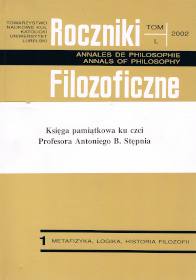How to speak about being? A contribution to the typology of metaphysics
Abstract
I suggest to distinguish the following three types of metaphysics:
(1) the metaphysics of undifferentiated being (Parmenides, B. Russell, W. V. O. Quine, M. A. Krąpiec, M. Przełęcki): to be (in the existential use) and to exist mean the same, all objects are/exist in the only one way (i.e. all objects are real), there are no nonexistent objects;
(2) the metaphysics of differentiated being (Plato?, Ch. Wolff, A. Meinong, K. Twardowski, J. J. Jadacki): the meaning of to exist is the one of many meanings of to be, all objects are but not all objects exist, there are nonexistent objects;
(3) the metaphysics of ways of existence (Aristotle, Thomas Aquinas?, R. Ingarden, A. B. Stępień): to be (in the existential use) and to exist mean the same, there are some different ways of being/existence (i.e. some objects are real, other objects are ideal or intentional, etc.), there are no nonexistent objects – if something does not exist in some way, it does not exist at all.
I consider in details the above-mentioned metaphysics. One can give some objections to each of them but there are some possibilities of their defence. How to choose one of given metaphysics? It seems that the choice of metaphysics is the choice of some uses of the words to be-to exist and its ontological commitments. I prefer the metaphysics of ways of existence because its universe is not too poor or too rich. This metaphysics is „the golden mean” between the metaphysics of undifferentiated being and the metaphysics of differentiated being.
Copyright (c) 2002 Roczniki Filozoficzne

This work is licensed under a Creative Commons Attribution-NonCommercial-NoDerivatives 4.0 International License.





